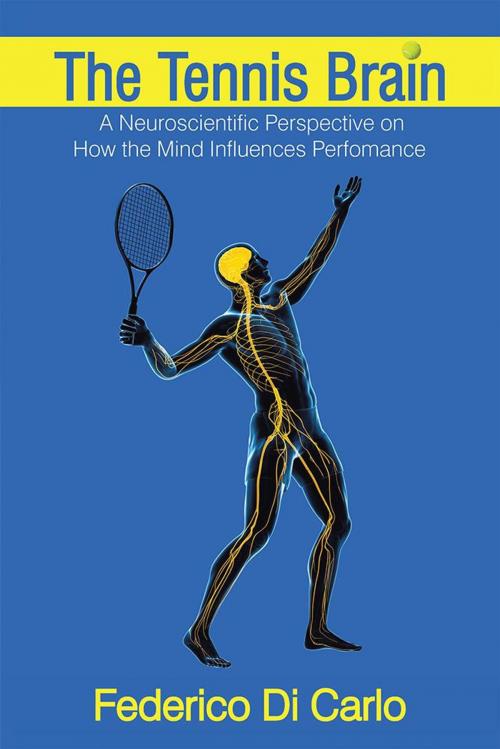The Tennis Brain
A Neuroscientific Perspective on How the Mind Influences Performance
Nonfiction, Health & Well Being, Medical, Specialties, Sports Medicine, Sports| Author: | Federico Di Carlo | ISBN: | 9781524664732 |
| Publisher: | AuthorHouse UK | Publication: | December 17, 2016 |
| Imprint: | AuthorHouse UK | Language: | English |
| Author: | Federico Di Carlo |
| ISBN: | 9781524664732 |
| Publisher: | AuthorHouse UK |
| Publication: | December 17, 2016 |
| Imprint: | AuthorHouse UK |
| Language: | English |
Most times, tennis players and athletes in general finish the competition unhappy about their performances. They feel that the potential was there, but a hidden force prevented them from achieving a feel-good performance. Performances, however, are never usually black and white. Most times athletes feel as though they were going through flows, flash-in/flash-out phases. Falls during performance are conventionally defined slumps and are among the most hated between athletes, above all when they feel that the main reason for slumps is not due to technical, tactical, or athletic flash-outs but rather to the mental components of the sport activity.
In The Tennis Brain, you will find the following:
Journey inside the processes and functions of the human brain
Find a neuroscientific-based evidence for theories on the mind and conscious processes
Discover why the game of tennis is so prone to mind influences
Understand how the mind processes influence tennis game-specific situations
Learn how to synchronize brain, body, and mind for best tennis in match performance.
Book Endorsements:
This work by Federico Di Carlo is a cornerstone among the contemporary research on cognitive neuroscience. The reader is introduced to the exploration and a step by step understanding of the brain and mind mechanisms. Through a fascinating journey in the world of tennis, the author motivates the reader to discover and change wrong behaviours in a positive way. This is a complete manual, useful to both tennis professionals and fans, as well as to anyone aspiring to achieve better results in the game of life (Renzo Ardiccioni, associate professor of communication, Universit du Maine, France).
Drawing upon a great number of studies as well as on the authors personal experience, Tennis Brain brings together neurosciences and tennis practice, challenging the readers to critically reconsider some of their habits and beliefs. Di Carlo summarises the extensive research produced in the last three decades and makes it accessible to a wider audience, bringing our understanding of key mental aspects of tennis out of the realm of empirical opinions and into the realm of science and knowledge. Tennis Brain can actually guide the readers to develop their own critical thinking and to learn to improve(Alessandro Bruinen Serio, PhD, founder of RISED [Research for Integrative and Sustainable Development]).
Since the first time we met, I was really impressed with Di Carlo well founded opinion, genuine love and immense enthusiasm for a neuroscientific driven tennis which comes out from every single page of The Tennis Brain. Starting from a presentation of the structural and physiological mechanisms of the nervous system and the psychological assets of the mind, Federico Di Carlo uses the tennis court to change the tennis player mind to a positive thinking and correct competitive mentality. For scientific consistency, I compared my thinking on the book with other readers and I received a similar feedback. The Tennis Brain actually might represent a benchmark in the developing field of cognitive neuroscience applied to sport coaching (Prof. Salvatore Guccione, Department of Drug Sciences, University of Catania).
Most times, tennis players and athletes in general finish the competition unhappy about their performances. They feel that the potential was there, but a hidden force prevented them from achieving a feel-good performance. Performances, however, are never usually black and white. Most times athletes feel as though they were going through flows, flash-in/flash-out phases. Falls during performance are conventionally defined slumps and are among the most hated between athletes, above all when they feel that the main reason for slumps is not due to technical, tactical, or athletic flash-outs but rather to the mental components of the sport activity.
In The Tennis Brain, you will find the following:
Journey inside the processes and functions of the human brain
Find a neuroscientific-based evidence for theories on the mind and conscious processes
Discover why the game of tennis is so prone to mind influences
Understand how the mind processes influence tennis game-specific situations
Learn how to synchronize brain, body, and mind for best tennis in match performance.
Book Endorsements:
This work by Federico Di Carlo is a cornerstone among the contemporary research on cognitive neuroscience. The reader is introduced to the exploration and a step by step understanding of the brain and mind mechanisms. Through a fascinating journey in the world of tennis, the author motivates the reader to discover and change wrong behaviours in a positive way. This is a complete manual, useful to both tennis professionals and fans, as well as to anyone aspiring to achieve better results in the game of life (Renzo Ardiccioni, associate professor of communication, Universit du Maine, France).
Drawing upon a great number of studies as well as on the authors personal experience, Tennis Brain brings together neurosciences and tennis practice, challenging the readers to critically reconsider some of their habits and beliefs. Di Carlo summarises the extensive research produced in the last three decades and makes it accessible to a wider audience, bringing our understanding of key mental aspects of tennis out of the realm of empirical opinions and into the realm of science and knowledge. Tennis Brain can actually guide the readers to develop their own critical thinking and to learn to improve(Alessandro Bruinen Serio, PhD, founder of RISED [Research for Integrative and Sustainable Development]).
Since the first time we met, I was really impressed with Di Carlo well founded opinion, genuine love and immense enthusiasm for a neuroscientific driven tennis which comes out from every single page of The Tennis Brain. Starting from a presentation of the structural and physiological mechanisms of the nervous system and the psychological assets of the mind, Federico Di Carlo uses the tennis court to change the tennis player mind to a positive thinking and correct competitive mentality. For scientific consistency, I compared my thinking on the book with other readers and I received a similar feedback. The Tennis Brain actually might represent a benchmark in the developing field of cognitive neuroscience applied to sport coaching (Prof. Salvatore Guccione, Department of Drug Sciences, University of Catania).















